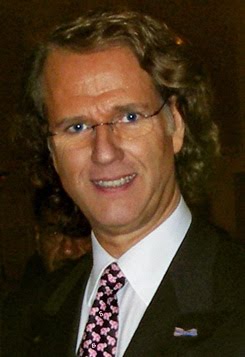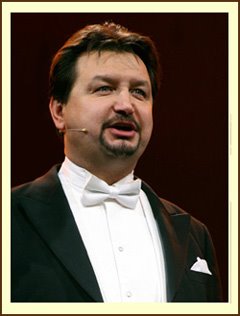Roger Diederen and René Henket play
an "Adams bugle" in André Rieu’s JSO
The Smallest Detail is Orchestrated to
Perfection
To touch the public "With our programming we are able to reach a much larger audience which normally does not visit a concert hall. In a concert hall people come to sit and listen. André wants to precisely avoid that. Programming and announcements are well thought out and are adapted to that. André knows exactly how to reach the public with his dialog. He is fluent in English, French and German, and is knowledgeable in Portuguese. By speaking to the public in their native tongue, he knows how to touch their hearts. And that triggers an interaction."
Investment: André Rieu determines to within the smallest detail how
the JSO will appear on stage or TV and what will be played. He is the front man. But the orchestra members and André read each other," explains Roger. "By his body language and the manner in which he holds his violin, we can tell what he desires. That does not happen with every orchestra. We know one another, because we have been playing together for such a long time, especially the brass section." Musically every member contributes. There are almost no ready-made arrangements that will occupy the JSO. René: "There is always a little compromising within the different sections. We always discuss matters. We are like flexible millipedes and that makes it nice and exciting. Not only when it comes to music, but in everything: just try to perform thirteen concerts in twelve days. You will definitely need to keep your wits about you."
Together: "Within the orchestra there prevails a great togetherness, everyone gets along, yet every one can do his/her own thing," Roger explains. Even romances flourish. That is how René met his Virginie. Together they have a one year old son." Everyone’s’ privacy is being honored. If you see someone with earphones on, you know not to bother them. And what really is important is that we all have many nice and interesting experiences and see a lot of the world together. In May we were conducted concerts in Chili and Argentina, while in March we were on tour in the United States, and performed in Brazil in April. In addition to that the JSO was freezing to death during their performance on the Museum Square on 30 April in commemoration of the inauguration of King Willem-Alexander. "It was a great but cold day," Roger explains. "In the evening it was around eight degrees (46F). That does not do the playing any favors. I could barely move my fingers." That day itself he spent on the DAM. "During the official proceedings it was dead still on the DAM. Normally that is unimaginable. A goose bumps moment."
"You lean to know yourself very well" was René’s answer to a question as to what the JSO had done to him for the last 25 years. "Musically you learn exactly how to address given situations. For instance, if you play in a non-acoustical place, the next day will seem as if you were in a bar with very loud music. If you are not careful about that, you will notice that the next day. You learn to know your limits." "You also learn to appreciate your free time" Roger adds. "As well at home as when on tour. We almost always play for a sold out venue, and the public expects the utmost from all of us. It is unimaginable to play on auto-pilot. André sees and hears everything. Between eight and eleven in the evening we are expected to deliver a top-notch presentation. And believe me, that does not happen if you decide to close the bar every evening." These words show maturity and responsibility. "My wife Miriam and my son Romano now receive whatever they desire. Skype, internet ... you can continuously be in contact with your wife and children. And that holds true for René as well, since his wife Virginie is a member of the JSO’s choir."
Down to earth boys:
No matter how successful the musicians of the JSO are, they
remain down to earth boys. "We all hail from the amateur music background and I
rehearse regularly with St Cecelia in Schinnen," says Roger. "I do not feel
superior to them at all." He finds a decent childhood growth with that band. The
structured upbringing in his youth is now paying off. Every day there are people
involved to ensure everything goes according to plan. And you need experienced
leaders. "It is important that you approach the student as an individual," René
adds. He himself teaches and finds it interesting to develop lesson plans and in
the meantime has amassed quite a number of methods from all over the world.
According to him the methods should often be priority, but need to be tailored
to the student. Parental involvement plays a very important role and often leads
to the parents taking up an instrument, or take on a position of leadership or
coordination within the marching band. That way you can keep the children
involved. We play high-level, but the social aspect is also important."
Roger’s son Romano receives supplemental lessons from René. "I
have no patience for theory," Roger admits. "For the practical lessons, yes, I
can spend much time on those. At least if the student is well motivated."
Is there life outside the JSO? René: "We have a job that
requires us to be available 365 days a year. Sometimes the orchestra has to be
ready at a moment’s notice. It is therefore difficult to build on other things
while in the JSO." Although Roger did have a chance to perform with the
well-known Limburg marching band "De Schintaler", which was revived this year.
"That was nice. I have some good memories from there. And not only because I met
my wife there."
- Thank you to Ineke for the article and John translating it








































































































































No comments:
Post a Comment